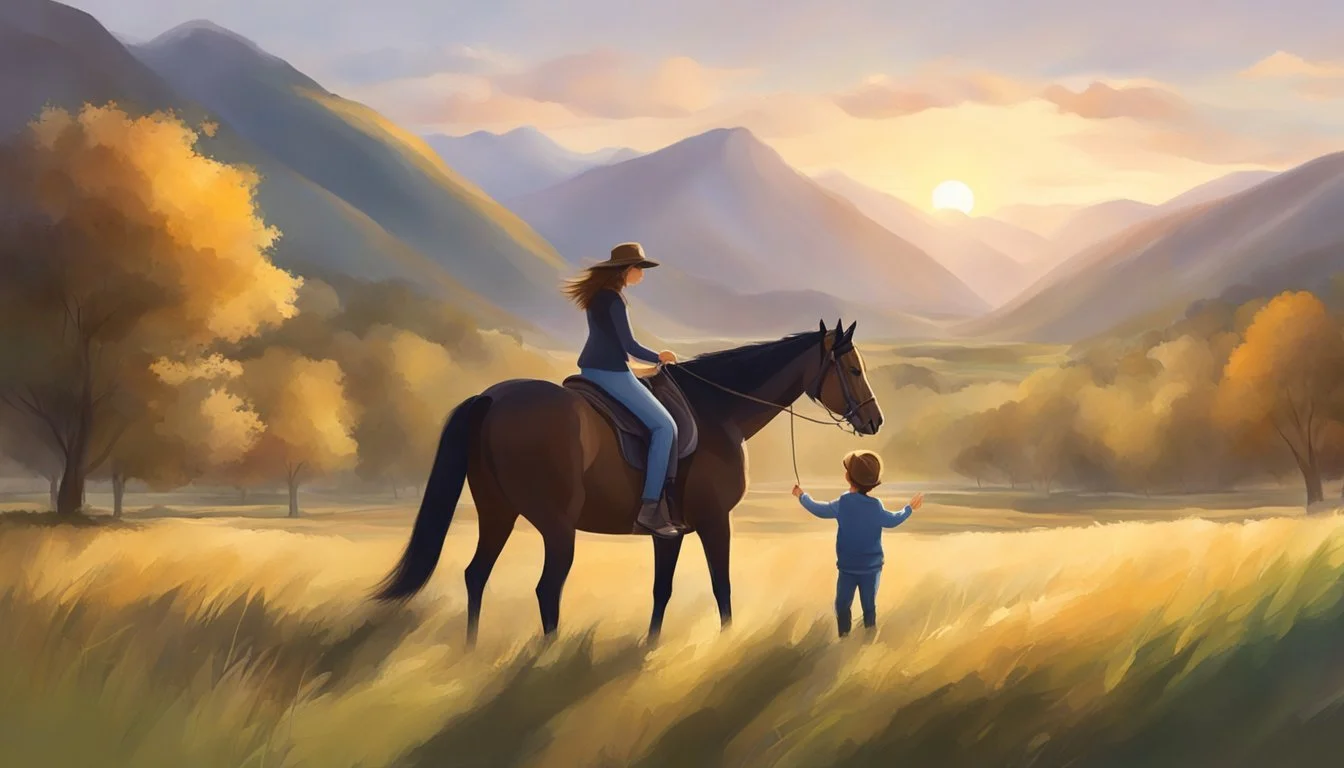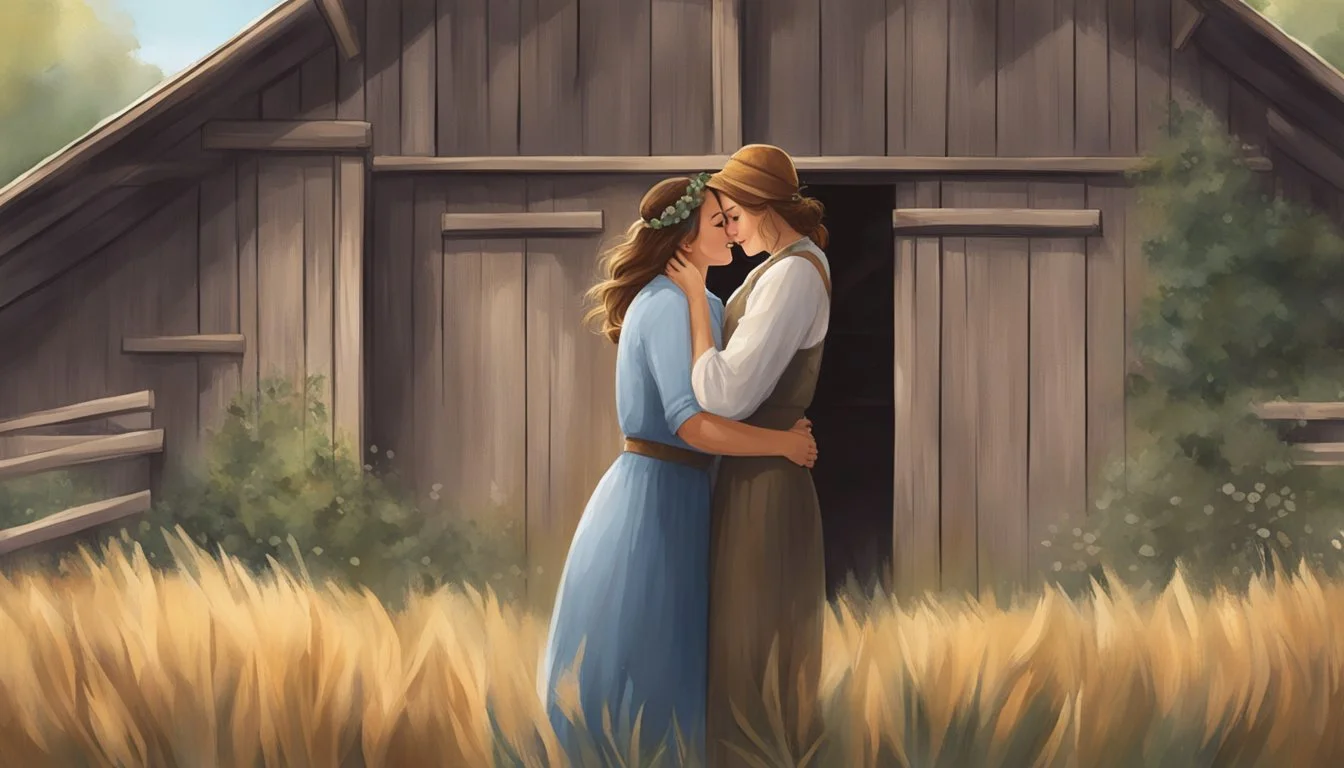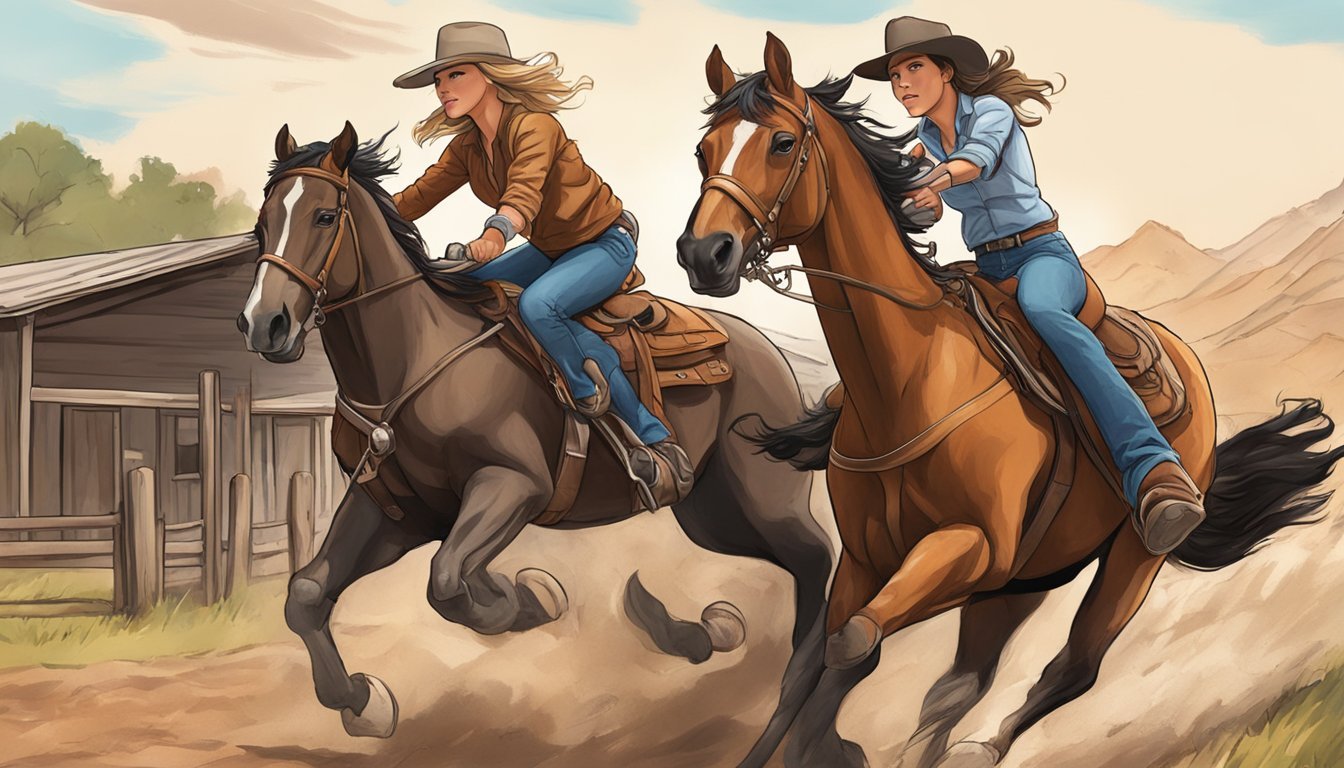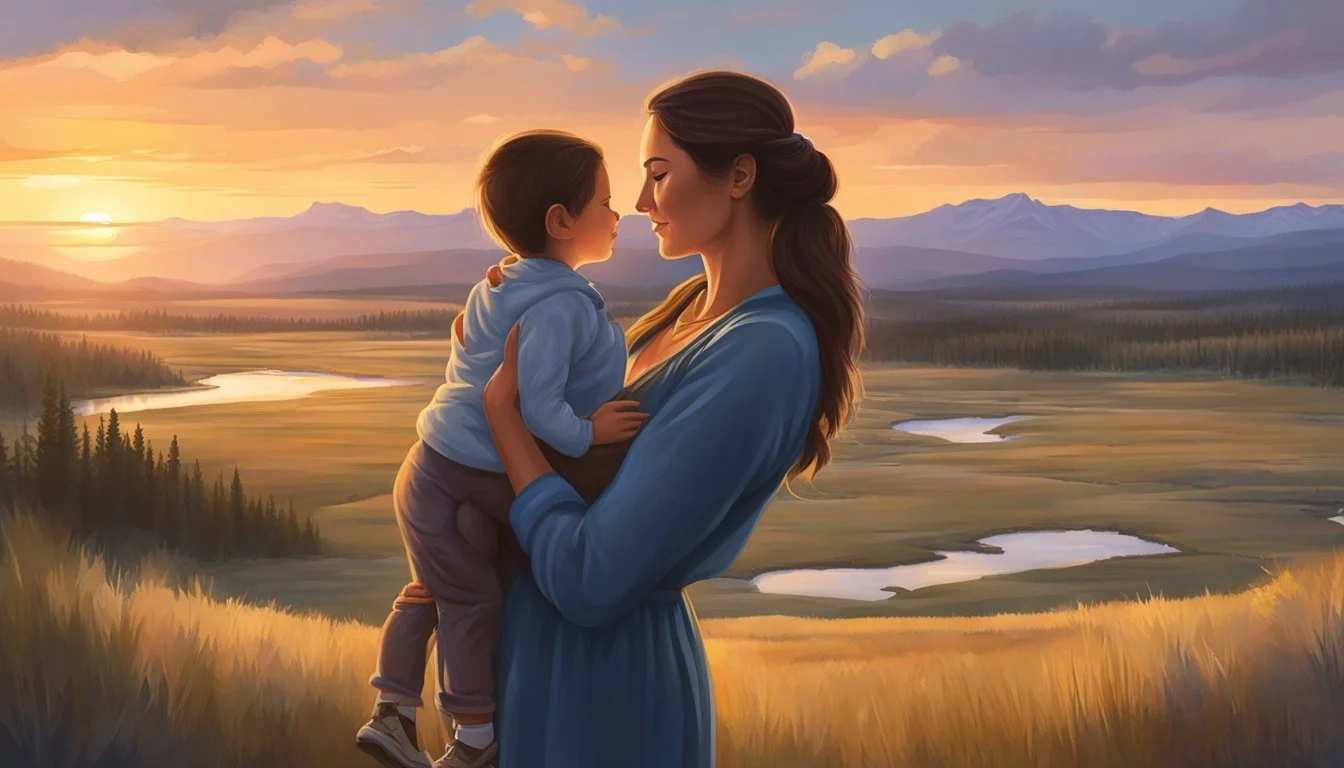11 Best Mother-Child Moments in Yellowstone
Emotional Scenes That Define the Dutton Family
Yellowstone, the gripping Western drama series, has captivated audiences with its intense storytelling and complex family dynamics. Among the show's many compelling relationships, the bonds between mothers and their children stand out as particularly poignant and powerful.
These mother-child moments in Yellowstone offer viewers a raw and honest look at the intricacies of family ties, showcasing both fierce loyalty and deep-seated conflicts. From tender exchanges to heated confrontations, these scenes provide insight into the characters' motivations and add depth to the overarching narrative of the Dutton family saga.
1) Monica teaching Tate survival skills
Monica Dutton, a Native American woman from the Broken Rock Reservation, imparts valuable survival skills to her son Tate. As a mother deeply connected to her heritage, she ensures Tate learns traditional knowledge passed down through generations.
Monica teaches Tate how to identify edible plants and track animals in the wilderness. She shows him techniques for building shelters and starting fires using natural materials found in their surroundings.
Through these lessons, Monica strengthens her bond with Tate while helping him develop self-reliance and respect for nature. She emphasizes the importance of understanding the land and its resources, a crucial aspect of their Native American culture.
These moments highlight Monica's role as both a protective mother and a cultural mentor. By sharing her wisdom, she prepares Tate to navigate the challenges of life on and off the Yellowstone Ranch.
Monica's teachings blend practical survival skills with deeper cultural lessons, fostering Tate's connection to his Native American roots. These mother-son interactions showcase the series' exploration of family dynamics and cultural identity.
2) Beth comforting John in the kitchen
Beth Dutton's fierce loyalty to her father John is a cornerstone of their relationship in Yellowstone. One touching moment occurs when Beth finds John in the kitchen, struggling with a personal issue.
Sensing her father's distress, Beth approaches him with uncharacteristic gentleness. She offers words of comfort and support, temporarily setting aside her usual sharp-tongued demeanor.
John, typically stoic and reserved, allows himself a moment of vulnerability with his daughter. Beth's presence provides solace as they share a quiet conversation over coffee.
This scene highlights the deep bond between father and daughter. It showcases Beth's softer side, rarely seen by others on the ranch. Their interaction demonstrates the mutual understanding and respect that underpins their complex relationship.
The kitchen setting adds intimacy to their exchange, creating a rare moment of peace amidst the usual chaos of Dutton family life. This brief interlude strengthens their connection and reminds viewers of the love at the heart of their dynamic.
3) Kayce and Tate fishing together
Kayce Dutton and his son Tate share a special bond, often exemplified through their outdoor activities. One of their most heartwarming moments occurs when they go fishing together.
The scene showcases Kayce's dedication to passing down family traditions and outdoor skills to his son. As they sit by the river, Kayce patiently teaches Tate the art of fly fishing.
Their conversation is filled with gentle guidance and encouragement from Kayce. He demonstrates proper casting techniques and explains the importance of reading the water.
Tate's excitement is palpable as he attempts to mimic his father's movements. The moment they catch a fish together brings pure joy to both their faces.
This fishing expedition serves as a brief respite from the chaos often surrounding the Dutton family. It allows Kayce and Tate to strengthen their father-son relationship in the peaceful Montana wilderness.
The scene highlights the softer side of Kayce's character, contrasting with his usual intense demeanor. It also emphasizes the importance of family bonding in the Yellowstone universe.
4) Monica and Tate's heartfelt bedtime conversation
Monica Dutton's relationship with her son Tate is a cornerstone of their family dynamic on Yellowstone. One touching moment between them occurs during a bedtime conversation.
In this scene, Monica comforts Tate after a difficult day. She listens attentively as he shares his worries and fears, demonstrating her nurturing nature.
Monica offers gentle words of encouragement, helping Tate feel safe and understood. Her calm demeanor and patient responses showcase the strong bond between mother and child.
This intimate exchange highlights Monica's dedication to her son's emotional well-being. It reveals her ability to create a secure space for Tate to express himself freely.
The conversation also illustrates Monica's skill in balancing her roles as a supportive mother and a guiding figure. She validates Tate's feelings while providing reassurance and wisdom.
This heartfelt moment underscores the importance of open communication in their relationship. It demonstrates how Monica prioritizes emotional connections within her family, despite the challenges they face.
5) Beth reminiscing about her mother's advice
In the first season of Yellowstone, viewers witness a poignant flashback featuring Beth Dutton and her mother, Evelyn. This scene offers a rare glimpse into Beth's past and her complex relationship with her mother.
The flashback takes place when Beth experiences her first menstrual cycle. Despite their often strained relationship, Evelyn steps in to offer guidance and support during this pivotal moment in her daughter's life.
Evelyn imparts wisdom about womanhood and the challenges Beth may face. She advises Beth to be strong and resilient, traits that become central to Beth's character as an adult.
This memory stands out as one of the few positive interactions between Beth and her mother shown in the series. It provides insight into the formation of Beth's tough exterior and her approach to navigating the male-dominated world of the Dutton ranch.
The advice given by Evelyn continues to influence Beth's actions and decisions throughout the show. It serves as a bittersweet reminder of the mother-daughter bond that was cut short by Evelyn's untimely death.
6) Beth and Evelyn's touching horse-riding moment
Beth Dutton's relationship with her mother Evelyn was complex and often tense. A pivotal moment in their dynamic occurred during a horse-riding excursion with young Beth, Kayce, and Evelyn.
As they rode together, Beth's horse became spooked, causing her to struggle for control. Rather than offering support, Evelyn scolded Beth for showing fear. This harsh reaction reflected Evelyn's tough parenting style and expectations for her children.
The situation quickly escalated when Evelyn's own horse was startled by Beth's distress. In a tragic turn of events, Evelyn fell from her horse and was fatally injured. This incident left a lasting impact on Beth, shaping her complex feelings about horseback riding and her relationship with her mother.
While not conventionally touching, this moment reveals the intricate dynamics of the Dutton family. It showcases the high stakes of their ranching lifestyle and the expectations placed on even the youngest family members.
7) Monica supporting Tate during a panic attack
Monica Dutton's unwavering support for her son Tate shines through during a pivotal moment in Yellowstone. When Tate experiences a severe panic attack, Monica demonstrates her strength as a mother and her deep understanding of her child's needs.
Recognizing the signs of Tate's distress, Monica quickly moves to comfort him. She uses calming techniques and reassuring words to help Tate regain control of his breathing and emotions.
Monica's patience and empathy are evident as she stays by Tate's side throughout the episode. She creates a safe space for him to express his fears and anxieties without judgment.
This scene highlights Monica's resilience and her ability to be a rock for her son during challenging times. It showcases the strong bond between mother and child, forged through shared experiences and unconditional love.
Monica's actions during this moment reinforce her character's importance in the Yellowstone narrative. She proves to be a vital source of stability and comfort for Tate amidst the often turbulent world of the Dutton family.
8) Tate's excitement after winning a rodeo with Monica cheering
Tate Dutton's passion for rodeo shines through in a heartwarming scene on Yellowstone. The young cowboy competes in a junior rodeo event, showcasing his growing skills in the arena.
Monica, ever the supportive mother, watches from the sidelines with pride and anticipation. Her eyes never leave her son as he demonstrates his budding talent.
As Tate completes his run, the announcer declares him the winner. The boy's face lights up with pure joy and accomplishment. He pumps his fist in the air, beaming from ear to ear.
Monica rushes to embrace her son, wrapping him in a tight hug. Her cheers and words of praise echo through the arena. The moment captures the strong bond between mother and child.
This victory represents more than just a rodeo win for Tate. It symbolizes his growing connection to the Dutton family legacy and way of life. Monica's enthusiastic support highlights her acceptance of this part of Tate's heritage.
The scene beautifully illustrates the balance Monica and Tate have found between their Native American roots and the ranching world. It's a touching display of maternal love and a child's triumph.
9) Beth's emotional visit to her mother's grave
Beth Dutton's complex relationship with her late mother is a recurring theme in Yellowstone. In a poignant scene, Beth visits her mother's grave, revealing a vulnerable side rarely seen in her tough exterior.
The moment is fraught with conflicting emotions. Beth grapples with guilt over her role in her mother's death, which has haunted her for years.
At the gravesite, Beth reflects on their complicated bond and the void left by her mother's absence. This visit represents a rare instance of Beth confronting her deep-seated pain and unresolved feelings.
The scene provides insight into Beth's character, showcasing the emotional scars that drive her fierce behavior. It highlights the lasting impact of childhood trauma on her adult relationships.
Beth's grave visit also serves as a turning point, possibly opening the door for healing and growth. It demonstrates her capacity for introspection and connection to her family history.
10) Evelyn doting on young Beth in the barn
In a rare tender moment, Evelyn Dutton shows affection towards her daughter Beth. The scene takes place in the family barn, providing a cozy backdrop for this mother-daughter interaction.
Evelyn gently braids Beth's hair while sharing stories of her own childhood. She imparts wisdom about the importance of inner strength and resilience, traits that Beth will come to embody in her adult years.
The usually stern Evelyn softens her demeanor, allowing a glimpse of the nurturing side she often keeps hidden. Beth, typically guarded around her mother, relaxes and enjoys this rare moment of maternal care.
This scene stands out as it contrasts sharply with the typically strained relationship between Evelyn and Beth. It offers insight into the complex dynamics of the Dutton family and hints at the potential for a closer bond between mother and daughter.
The barn setting symbolizes the Dutton legacy, making this moment of connection between Evelyn and Beth particularly poignant. It underscores the importance of family ties in the Yellowstone universe.
11) Kayce saving Tate during the ranch ride
Kayce Dutton's protective instincts shine during a memorable ranch ride with his son Tate. As the father-son duo enjoy a peaceful day on horseback, an unexpected danger arises.
Tate's horse suddenly spooks, threatening to throw the young boy. In a split second, Kayce's quick reflexes and ranching skills come to the fore. He swiftly maneuvers his own horse alongside Tate's, reaching out to steady his son.
With calm reassurance, Kayce helps Tate regain control of his mount. He demonstrates both physical prowess and emotional support, embodying the ideal of a strong yet nurturing parent.
This incident showcases the deep bond between Kayce and Tate. It highlights Kayce's dedication to keeping his son safe while also teaching him valuable lessons about horsemanship and facing fears.
The moment resonates with viewers, offering a tender glimpse into the Dutton family dynamics. It underscores Kayce's growth as a father and his commitment to passing on the ranching lifestyle to the next generation.
Impact of Family Dynamics on Mother-Child Relationships
Family dynamics in "Yellowstone" shape the complex mother-child relationships. These interactions reveal intergenerational conflicts and moments of bonding that drive character development.
Intergenerational Tensions and Resolutions
The Dutton family's matriarch, Evelyn, casts a long shadow over her children's lives. Her influence is felt through flashbacks and memories, affecting how Beth and Jamie interact with their father John. This dynamic creates tension between generations, as the adult children struggle to meet expectations set by their deceased mother.
Beth's relationship with her adoptive son, Carter, reflects her own complicated history. She attempts to break the cycle of harsh parenting while maintaining the Dutton family's tough exterior. This struggle showcases the difficulty in overcoming ingrained family patterns.
John's interactions with his children often mirror his late wife's parenting style. This continuity highlights how family dynamics persist across generations, for better or worse.
Character Development Through Mother-Child Bonding
Monica's bond with her son Tate serves as a counterpoint to the Dutton family dynamics. Their relationship evolves as they face external threats, strengthening their connection and providing depth to both characters.
Beth's journey toward motherhood with Carter reveals her vulnerabilities and capacity for growth. This unexpected relationship challenges Beth's self-perception and allows her to confront her past traumas.
Rainwater's connection to his ancestors, particularly his mother and grandmother, influences his leadership style and decision-making. This spiritual bond demonstrates how mother-child relationships can extend beyond immediate family and shape entire communities.
These mother-child interactions drive personal growth and plot development, adding layers of complexity to the characters and enriching the overall narrative of "Yellowstone."
Cinematic Techniques Enhancing Emotional Depth
Yellowstone's cinematography skillfully amplifies the emotional resonance of mother-child moments. Camera work and visual symbolism play crucial roles in deepening viewers' connection to these poignant scenes.
Use of Close-Ups and Dialogue
Close-up shots in Yellowstone capture the nuanced facial expressions of mothers and children, revealing unspoken emotions. These intimate frames allow viewers to witness the subtle shifts in a character's eyes or the trembling of a lip, conveying complex feelings without words.
The series often pairs these close-ups with carefully crafted dialogue. Conversations between mothers and children are filmed to emphasize the emotional weight of their words. Camera angles shift to highlight reactions, creating a visual dialogue that complements the spoken one.
Yellowstone's cinematographers use shallow depth of field to isolate characters during intense exchanges. This technique blurs the background, forcing viewers to focus on the emotional core of the scene.
Symbolic Imagery and Settings
Yellowstone utilizes its breathtaking Montana landscapes as more than just a backdrop. The vast, open spaces often mirror the emotional expansiveness of mother-child relationships. Rolling hills and distant mountains can symbolize the enduring nature of familial bonds.
Indoor settings are equally significant. The Dutton family ranch house serves as a visual metaphor for maternal protection and legacy. Scenes between mothers and children filmed in this space carry added layers of meaning.
Lighting plays a crucial role in enhancing symbolism. Warm, golden hues often bathe positive interactions, while cooler tones might underscore moments of tension or separation. This subtle color palette guides viewers' emotional responses to the unfolding drama.













